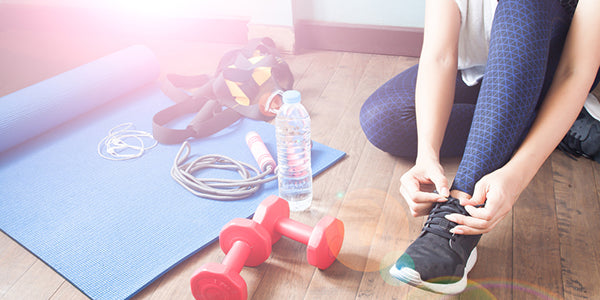
We live in a country where we are preoccupied with age, cringe with each passing birthday, but must ultimately accept we need to zero in on our health as we get older.
As women age, it is vital that to focus on specific aspects of their health. As early as their 20s, women's risks for developing health problems increases and certain tests and procedures are governed.
But above all, adopting a healthy lifestyle as soon as possible helps improve women's health for years to come!
What Is Women's Health?
From bearing children to balancing work and family life, answering "Why is women's health so important?" is a no-brainer. Women's health consists of numerous puzzle pieces, including partaking in routine screenings and exams, balancing the diet with nutritious and enjoyable foods, exercising on a regular basis, and implementing other healthy lifestyle factors.
Vaccinations, Screenings, and Exams
In addition to reviewing lifestyle habits with your primary care provider annually, be sure to stay on top of vaccinations, screenings, and exams. General recommendations include:
• The flu shot each year, a tetanus booster every 10 years, and the human papillomavirus (HPV) vaccine if under age 21. However, you should always talk to your doctor about which shots are recommended and how often they may need administered.
• Testing for sexually transmitted diseases once becoming sexually active, along with if or when changing sexual partners.
• Eye exams at least once every two years, though annual exams are recommended if experiencing or having a history of vision problems.
• Dental exams completed twice a year for teeth cleaning and other preventative maintenance unless instructed differently by your dentist and dental hygienist.
• Blood pressure screenings bi-annually, yet recommended more often if a personal or family history of heart disease and stay in the know of type 2 diabetes risk factors.
• Colon screenings at age 50, though you should talk with your doctor regarding the initiation and frequency of colonoscopies, sigmoidoscopies, and stool tests.
Female-specific and age-related screenings and exams include:
• Breast self-exams (starting in your 20s)
• Pap smears and pelvic exams (starting in your 20s)
• Reproductive health (20s to 20s)
• Pregnancy and breastfeeding health (20s to 20s)
• Menopausal health (around age 50)
• Bone density screenings (age 65 and up)
Diet
Whereas diet is necessary to improve health outcomes, the term "diet" is a term many women dread… All too often, we make weight loss and health out to be more difficult than it needs to be and resort to extreme fad diets that leave us cranky and malnourished. That being said, it is important to dismiss the notion of "dieting," but rather embrace a balanced eating pattern.
Eating balanced, well-rounded meals with the proper vitamins and nutrients not only allows the body to function at its optimum level, but lessens the risk of chronic health conditions such as obesity, heart disease, high blood pressure, diabetes, and cancer.
That being said, a balanced diet is the cornerstone of women's health and crucial during any stage of life, as it can also help reduce premenstrual and menopausal symptoms, boost fertility, combat stress, ease pregnancy and nursing, just to name a few.
But eating healthier does not have to be a difficult task and can be achieved with the following tips:
• Balance Your Meal Plate
To naturally keep calories in check and nutrients optimized, ½ the plate with non-starchy vegetables, ¼ of the plate should be reserved for protein, and reserve the remaining ¼ of the plate for complex carbohydrates.
• Swap Out Refined Grains with Whole Grains
Choose whole grains and wheat products over refined products, as wheat and related grains contain wholesome vitamins, minerals, and fiber that white and processed foods generally lack. In addition to wheat, whole grains include oats, barley, rice, and rice.
• Add Veggies to All Meals and Snacks
Including colorful veggies is a natural way to optimize nutrient intake while keeping calories in check. Be sure to incorporate some sort of veggie to meals and snacks, including spinach in smoothies, broccoli mixed into casseroles, and carrot sticks with hummus.
• And Don't Forget Protein and Healthy Fats
Also including protein and healthy fats into meals and snacks helps induce satiety to keep you fuller for longer bouts of time. Nutritious options include chicken breasts, sirloin, tuna, peanut butter, nuts and seeds, avocados, and olive oil.
• Watch Out for Liquid Calories
Reduce or avoid soft drinks, fruit juices, and artificial sweeteners as much as possible, as they often lack any sort of nutritional value and are loaded with calories. And while happier hours can certainly be enjoyed, women are advised to limit alcoholic beverages to one drink per day.
Ultimately, women are encouraged to drink 11.5 cups (2.7 liters) of fluids daily, particularly achieved via water intake.
• Build A Healthier Relationship with Food
In addition to consuming nutritious foods, having a healthy relationship with it is key to prosper both physical and mental health. Building and strengthening this relationship with food is paramount for having your cake and eating it, too, and here are the steps to take to do so.
• Consider bistroMD
Crunched for time? BistroMD understands the hardships of balancing the work obligations and responsibilities of motherhood and provides health diet plans for women. So if looking for a sustainable lifestyle change and something fast and convenient (all without the hassle of frequenting the grocery store), we offer diet plans for women to help you successfully lose weight!
And cooking with the freshest ingredients and offering over 200 recipes and a customizable menu, you should have no problem finding something to satisfy your taste buds and nutritional needs!
Our women's programs comes with the option to receive five-or-seven-days' worth of healthy meals delivered to your door, which ranges from $130 to $160. We also offer EATS (our essential and tasty snacks program), in which women receive two snacks per day, and cost just $1.50 per snack.
For more information on bistroMD and program and meal options, visit the official webpage here or call 866-201-3438 today!
Exercise
Including 150 minutes of moderate-intensity physical activity and at least two to three weight training sessions each week supports overall physical and mental health and lessens the risk of chronic disease. In fact, 150 minutes of weekly physical activity may lower coronary artery disease by 25 percent in women!
The primary importance is abandoning a sedentary lifestyle and running, hiking, dancing, biking, and playing recreational sports are just a few ways to do so. Taking the steps over the elevator, parking further away from the car, and walking the last 10 minutes of your lunch break are also simple methods to increase physical activity throughout the day.
But before starting any sort of exercise regimen, always verify with your primary care provider and start small and work up to work up to the recommendations as needed.
Stress Management
While some stress can keep you stimulated and motivated to excel in your job and other facets in life, too much of it can reap havoc on overall health. Moreover, chronic has stress has been linked to a plethora of health conditions, including obesity, depression, anxiety, and heart disease.
With stress having such a profound, negative impact on health, women are encouraged to identify and implement stress management techniques, including exercising, meditating, getting out in nature, calling a friend, or reading a book.
Relationships
Healthy relationships with partners, friends, neighbors, coworkers, etc. are key to overall health. In fact, a 75-year old study discovered good relationships keep us happier and healthier! Needless to say, take the time to nurture such connections, including by planning a date night or simply calling a friend to catch-up.
Likewise as important, continue strengthening your own personal relationship, as the solidarity helps us focus on inner growth and regeneration, prevents against burnout, enhances creativity, and enlightens new perspectives. And while it may seem impossible amidst your busy to-do list, here is how to find it when you are overbooked!
Sleep
The importance of catching those nightly Zzz's should not slept on, as going without it can negatively impact overall health. Moreover, inadequate sleep has been linked to weight gain, type 2 diabetes risk, heart disease, memory issues, and car accidents and injury!
Though there are age-specific sleep recommendations, adult women are generally encouraged to sleep between seven to nine hours on a nightly basis. But if struggling to get adequate shuteye, create a healthy bedtime routine by staying consistent with bedtimes, powering down from electronics, and evaluating your room environment.







